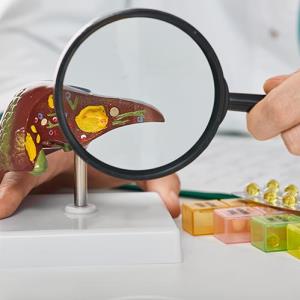Use of prednisone in patients with severe alcohol-associated hepatitis (SAH) results in significantly better overall and transplant-free survival at 90 days and a lower incidence of acute kidney injury (AKI) when compared with the use of anakinra plus zinc, results of a study have shown.
“There is no approved treatment for SAH,” according to the investigators, led by Samer Gawrieh from the Division of Gastroenterology and Hepatology, Indiana University, Indianapolis, US.
“In this double-blind randomized trial, patients with SAH treated with prednisone using the Lille stopping rule on day 7 had higher 90-day overall and transplant-free survival and lower rates of AKI compared to patients treated with a combination of anakinra and zinc,” they added.
Gawrieh and colleagues conducted this phase IIb double-blind randomized trial in adults with SAH and Model for End-Stage Liver Disease (MELD) scores of 20‒35 to compare the efficacy and safety of a combination of anakinra, an IL-1 antagonist, and zinc with prednisone.
A total of 147 patients with SAH were randomly assigned to receive either daily prednisone 40 mg orally for 30 days (n=73) or anakinra 100 mg subcutaneously for 14 days plus daily zinc sulfate 220 mg orally for 90 days (n=74). [J Hepatol 2024;80:684-693]
The investigators ceased the use of prednisone or prednisone placebo if the day-7 Lille score was >0.45. All study drugs were discontinued for uncontrolled infection or ≥5-point increase in MELD score. Overall survival at 90 days served as the primary endpoint of the study.
The randomized trial ended early when the prespecified interim analysis revealed that the use of prednisone, compared with anakinra plus zinc, resulted in higher 90-day overall survival (90 percent vs 70 percent; hazard ratio [HR], 0.34, 95 percent confidence interval [CI], 0.14‒0.83; p=0.018) and transplant-free survival (88 percent vs 64 percent; HR, 0.30, 95 percent CI, 0.13‒0.69; p=0.004).
“Prednisone resulted in better overall and transplant-free survival at 90 days,” said the investigators.
In addition, the incidence of AKI was significantly greater with anakinra plus zinc than with prednisone (45 percent vs 22 percent; p=0.001). However, the rates of infection were similar between the two treatment arms (31 percent vs 27 percent, respectively; p=0.389).
“The data support continued use of glucocorticoids for patients with SAH, with treatment discontinuation for those with a Lille score >0.45 on day 7,” Gawrieh said.
Corticosteroid use
“SAH is associated with high short-term mortality,” according to the investigators, noting that glucocorticoids for 28 days improve survival at 30 days but not 90 days.
A previous study reported the association of corticosteroid use with increased 30-day survival in patients with SAH, particularly in those with MELD scores between 25 and 39. However, the survival benefit did not persist at day 90 or 180. [J Hepatol 2021;75:1026-1033]
“A MELD score >51 can be used to define futility of corticosteroid treatment in patients with SAH,” the authors said.

